13 Best Herbs for a Witch’s Garden
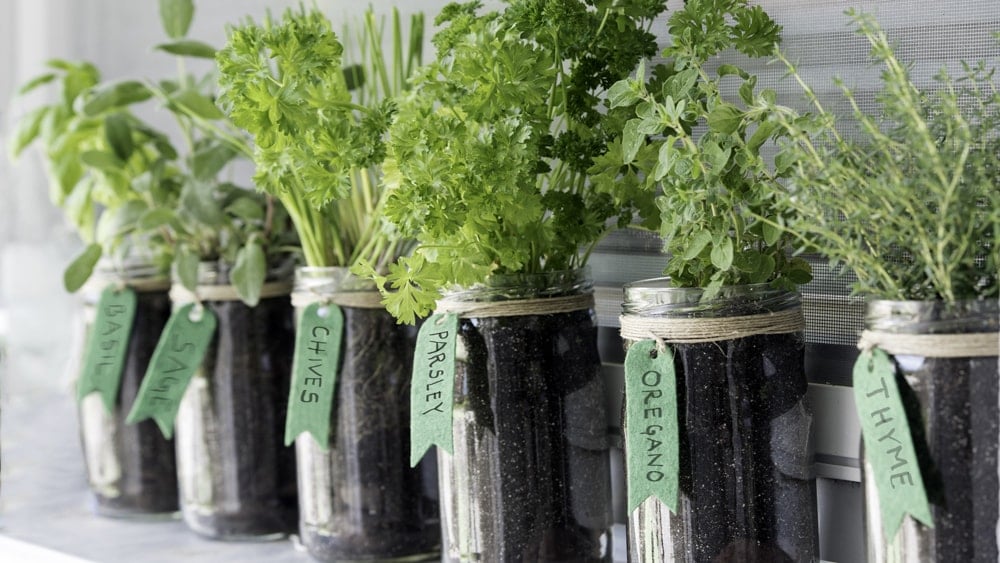
April 16, 2021
Estimated Read Time: 9 Minutes
As we all know, nature plays a huge part in Wiccan rituals. So why not bring the ingredients you need into your home — or your yard? If the prospect of cultivating your garden is a bit overwhelming, don’t worry, we’ve narrowed down a list of thirteen herbs that are all great choices!
Mind you, while most of the herbs we’re about to discuss have magickal properties, some of them have other beneficial properties as well. For example, basil, mint, lavender, and rosemary are all considered to be natural pest deterrents. So even though we use them for casting, their protective properties extend to our gardens too.
Many of the plants on our list can thrive indoors as well. So with that in mind, let’s talk about the herbs that are great for witches to grow.
Top 13 Herbs a Witch Should Plant
Basil

Basil leaves have a wonderfully complex flavor that makes them ideal for culinary purposes. However, that’s not the only benefit we get from the herb.
Namely, basil can help us fight bacterial infections and even strengthen our immune systems against viruses. Additionally, it seems to be an effective treatment for bloating, as well as kidney and liver issues. But how can it be used in Wiccan practices?
Well, basil is useful for casting protective and warding spells, as well as attracting love, money, and general prosperity. It’s mainly associated with Mars (Ares) and therefore gives off fiery masculine energy.
You can plant basil in your garden or in a container — though you’ll need to ensure adequate moisture drainage. The herb needs to get about seven hours of sunlight every day. However, if you opt to plant it outside, make sure to plant it near vegetables, not herbs. If you must, you can keep it near rosemary or chamomile, but make sure it’s nowhere near sage or rue.
Chamomile

Chamomile is famous for its soothing effects. Aside from promoting sleep and relaxation, it can also reduce inflammation and pain. Needless to say, these associations make chamomile ideal for anxiety and stress-relieving spells. On top of that, we can use them to attract happiness, peace, as well as money, and success.
Washing your hands in chamomile tea will attract abundance. Alternatively, you can also use dry chamomile flowers to cleanse your space and release negative energy. We usually associate chamomile with the Sun and various solar deities. So if you need someone to call to during a ritual, try Apollo, Helios, or Ra.
You’ll note that the flowers of this plant look a lot like common daisies. But unlike daisies, chamomile doesn’t grow as easily. You’ll want to be particularly vigilant about watering the herb during the summer, though it generally needs dry soil. If you can, plant your chamomile somewhere that’s partly in the shade.
You could also grow the herb in a container, though you’ll have to make sure it has room to grow. After all, chamomile loves to spread out — though it also likes to grow next to mint or basil! Lastly, depending on the type of chamomile you get, it’ll either produce flowers annually or perennially.
Chives
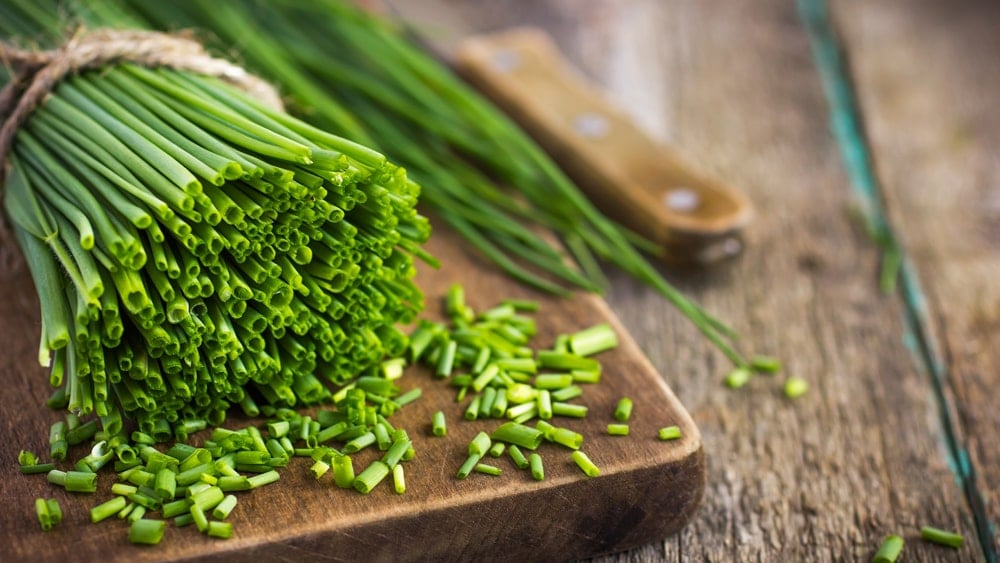
Chives are another herb that is associated with Mars and masculine energy. As such, it helps repel evil spirits, cast wards, and other protection spells, as well as break hexes. On a more medicinal level, eating chives can also help us fight off bacterial, viral, and fungal infections. And it’s been shown to repel certain insects!
Best of all, you’ll be able to take advantage of those effects whether you plant the herb in your garden or indoors. If you have to use a container, you’ll need to give each plant about 6 inches of space. It won’t spread out as it grows, but more chives will probably want to come out from the ground.
Ultimately, you’ll be able to harvest your chives several times each year. You’ll just have to wait until it’s about 6 inches tall, then snip the leaves at the base.
Our free Wicca 101 course provides the essential knowledge and skills
you need to start confidently practicing Wicca.
Join the Wicca Academy community today!
Cilantro
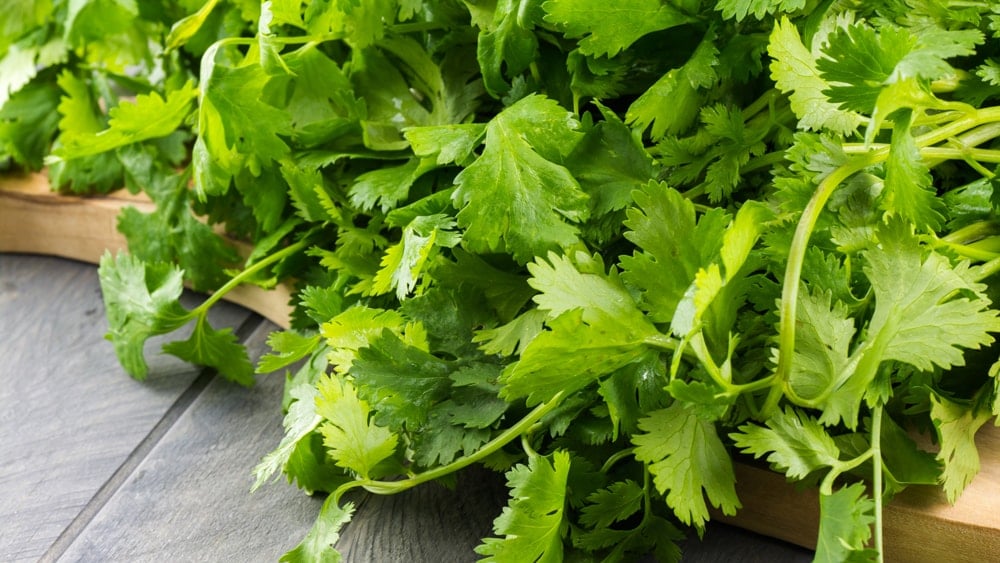
Cilantro, a.k.a. Mexican parsley, is an herb we often sprinkle over various soups, as well as bean, egg, and fish-based foods. The annual plant is a wonderful garden companion for tomatoes and spinach. Additionally, it goes well with basil, mint, and lavender, among other things.
Now, cilantro contains an antimicrobial compound that could help us fight off infections and food poisoning. However, the real benefits of cilantro go beyond its culinary and medicinal uses. Namely, the seed of the cilantro plant, called Coriander, is an ingredient many Wiccans use for healing spells and even to attract love!
If you decide to keep it in a planter, you’ll have to put it near a southern window. While the herb appreciates sunlight, hot weather makes it bolt pretty quickly. Still, once you figure out the right placement for your cilantro, it’ll be a wonderful addition to your garden.
Dill
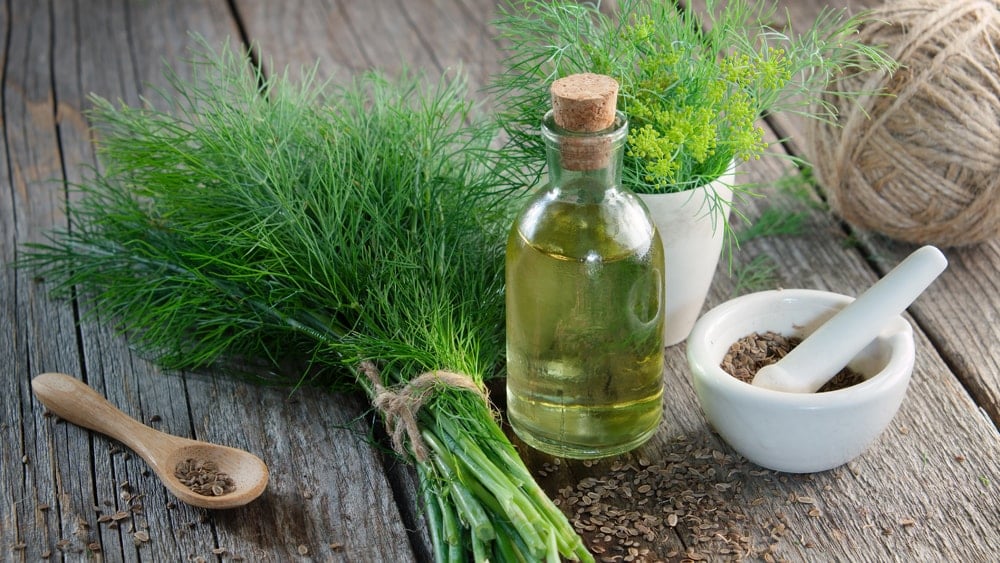
Dill is a fantastically flavorful herb to use in everyday cooking, particularly for soups, dips, and salads. It has numerous health benefits, such as promoting digestion, boosting immunity, and even reducing blood pressure and preventing diabetes. These attributes make it pretty useful for casting protection spells against diseases.
But the most popular use of dill as a spell casting ingredient is for love and lust spells. Since the herb is aligned with the element of fire and masculine energy, it’s also a useful ingredient for warding off evil magick and banishing spells.
The perennial herb should keep growing year-round, whether you plant it in a garden or keep it in a pot. However, you’ll want to figure out the size of the container based on the variety of dill you’re using. Above all, you’ll want to make sure the plant is getting plenty of direct sunlight. Do that, and your dill will not only enhance your spells but also help your garden thrive!
Lavender

Most people know exactly what lavender is used for. Whether you get it in dry form or as an essential oil, it’s generally considered to be an anxiety-relieving plant. As such, we can use it to attract serenity — but that’s not the only way to use lavender for spell casting.
Namely, lavender can also help us purify and cleanse our tools and space. Additionally, it can enhance our clairvoyant abilities. It’s also a common ingredient used in love and attraction spells.
This herb is associated with the goddess Hecate, the sorceress Circe, and many other female deities. However, since it’s also connected to the planet Mercury, it has distinctly masculine energy.
Above all, lavender needs direct sunlight and fairly dry soil. If you keep it in a pot, make sure the moisture can drain away freely. That will help it bloom throughout the year. However, if it only gets sunlight and drainage during the summer season, that’s when it will bloom.
Mint

Mint is another wildly popular ingredient for spell casting. The plant’s name comes from the Greek Menthe, which was the name of a nymph that tried to seduce Hades. The nymph was subsequently turned into a plant by Persephone. That should explain why we still associate this herb with the King and Queen of the Underworld.
On its own, the herb is a natural remedy for stuffy noses and upset stomachs. It could even improve brain function and bring mental clarity. In Wicca, we use it for healing and purification, as well as to enhance psychic awareness.
Unlike most of the herbs we’ve discussed so far, this perennial seems to fare best in wet soil. Its roots spread very quickly, so you might want to plant it in a container even if it’s in the ground or in your garden. Otherwise, in a few years you might have a garden completely full of mint! Still, mint will be a fantastic addition to your garden because it’s an effective insect repellent.
Mugwort
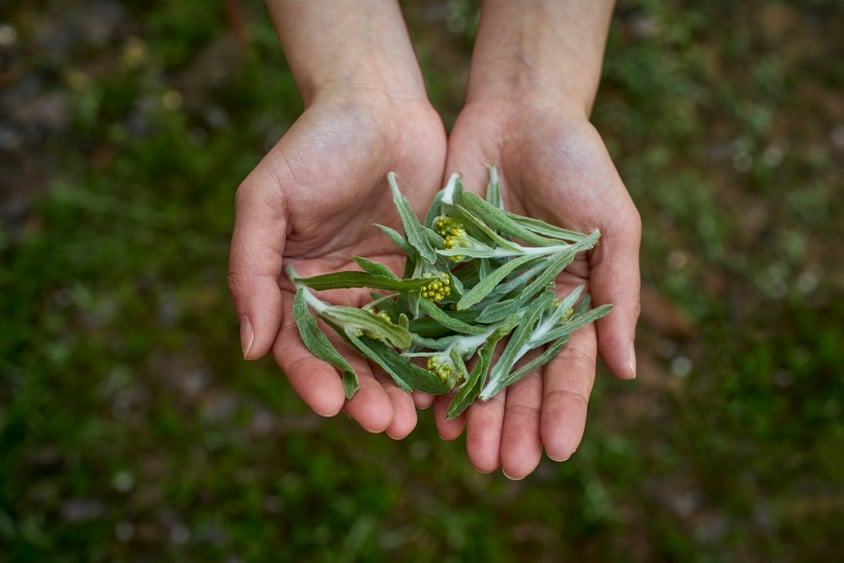
Over the centuries, people have used pretty much every part of the mugwort plant to achieve various results. The root of the herb was said to boost energy, while the other parts were used to relieve digestive issues. Some of those uses have even made it into folk magick practices. For example, people might put mugwort leaves in their shoes before embarking on long journeys.
In Wiccan practices, we use the bushy perennial plant to enhance various psychic abilities. Aside from scrying and divination, mugwort can also help us get into the right state of mind for lucid dreaming.
Notably, this plant is also known as Artemis Herb. That’s why we mainly associate it with Artemis or Diana. In any case, that’s what gives mugwort psychic properties that are perfect for practicing Lunar magick as well.
While mugwort is pretty flexible, it should ideally get plenty of direct sunlight and well-draining soil. Because of that preference, you can easily plant the herb in a pot, as long as you move it to the sun.
Oregano

Like most herbs on this list, oregano requires direct sunlight and well-draining soil. As long as it has those things, you can grow it in your garden or in your kitchen. If you keep it in a garden, the plant should be quite an effective pest repellant. However, it’ll also attract beneficial insects that help with pollination.
Believe it or not, oregano shares some common associations with mugwort. For example, both are associated with the planet Venus. Additionally, both offer protection, particularly when traveling. On top of that, oregano can boost creativity and happiness, and even enhance prophetic dreams.
Rosemary

Rosemary is a hugely important spell casting ingredient for Wiccan practices. It’s great for protection, purification, and cleansing spells, as well as attracting honesty, fidelity, and happiness. Additionally, you can use rosemary to improve your memory — wearing it while you study will help you retain information.
With that being said, rosemary doesn’t seem to get along with other herbs. Apparently, sage is its only companion. So you might want to plant it near vegetables instead, if you get the chance. Alternatively, you can just keep it in a pot.
As an evergreen shrub, rosemary should do well in moderate climates, though it’ll thrive in sunlight. Thanks to its strong aroma, rosemary should be an effective insect repellent as well.
Sage

Sage is an excellent herb for cleansing and purifying our space and tools before performing rituals. Like juniper, lavender, mugwort, and rosemary, this herb is great for smudging. Of course, if you don’t like the smell of burning herbs, you can always make a cleansing spray instead.
Other than its protective properties, sage also promotes wisdom, knowledge, and healing. It also enhances mental clarity and psychic power. On top of that, people have been using sage for its medicinal properties for centuries now.
If you don’t live in a humid climate, your sage will grow as a perennial. The plant should do well whether you keep it in a pot or you plant it in a garden. Just keep in mind that the only herb it seems to agree with is rosemary.
Savory
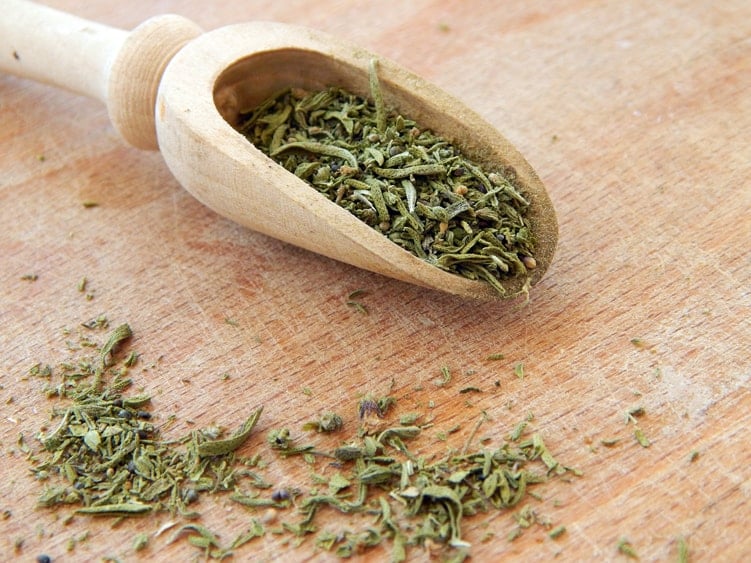
Summer and Winter Savory are aromatic herbs that belong to the mint plant family. As such, they share some of the same medicinal benefits as mint. However, unlike mint, these herbs still prefer well-drained soil and direct sunlight. Both can be annual or perennial, depending on the conditions.
The best way to utilize savory herbs in Wiccan practices is to carry or wear them in pouches. According to Wicca, the savory plant enhances mental powers. So it’s great for improving clairvoyance or practicing divination.
Thyme

Last but not least, we have thyme. If you’re looking to attract the blessings of the Fair Folk, this is the perfect herb to plant in your garden. Of course, you can also put it in a clay pot, as long as you provide plenty of sun, heat, and soil drainage.
Thyme can help treat colds and maintain overall health — but then again, so can many of the other plants on our list. As for its magickal benefits, this herb is unrivaled! We can use it for beauty spells, to gather strength and courage, and enhance psychic power. Additionally, thyme is famous for protecting against evil spirits, so having a bush in your garden or home can summon positive energy.
Cultivating the Ultimate Wiccan Garden
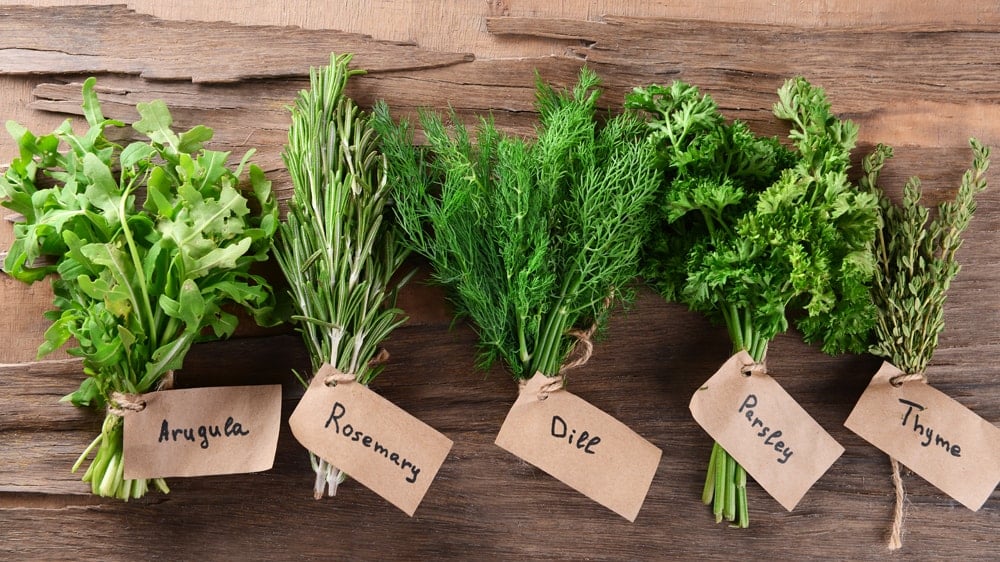
The herbs we’ve listed above are a good place to begin building your garden. Don’t feel obligated to plant all of these, even just one in a planter is a great start! These herbs are hardly the only ones you might want to use for your rituals though. Furthermore, fresh ingredients aren’t a necessity for casting spells. Many of the ingredients we use for spell casting could already be in your pantry! Happy casting!
Check out our other articles:
Sigils for Newcomers
Jar Spells Made Simple
Get to Know Your Familiar
Kitchen Magick for Beginners
Moon Phases and Simple Rituals
See All Articles
Love this article? Share the magick with your friends and loved ones!